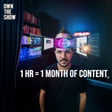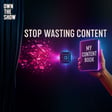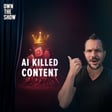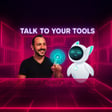Become a Creator today!Start creating today - Share your story with the world!
Start for free
00:00:00
00:00:01

The Simple Social Strategy That Quietly Builds Authority
In this AI marketing podcast episode, Dan Sanchez and Ken Freire unpack what it really takes to become an authority on social media in today’s chaotic content landscape. They break down the popular but vague "document, don't create" strategy and reshape it into something far more actionable: "learning in the light." Whether you're starting your thought leadership journey or rebooting it, they map out exactly how to build credibility by being a visible, humble learner.
My Favorite AI Tools
- Tella - https://danchez.com/tella
- High Level - https://danchez.com/highlevel
- Zencastr - https://danchez.com/podtools
- n8n - https://danchez.com/n8n
Timestamps
- 00:00 - Why Gary Vee's "document" advice misses the mark
- 01:44 - The evolution of social media from quotes to "interest media"
- 03:51 - What still works: authenticity and storytelling
- 04:22 - How to choose what to post: be helpful, not vague
- 06:10 - The power of asking questions vs. giving advice
- 09:09 - Vulnerability vs. oversharing: where to draw the line
- 13:06 - Why optimism is essential for authority
- 14:29 - Fit2Fat2Fit and the "journey to mastery" model
- 16:08 - Should you share failures too? Yes, with the right frame
- 19:19 - The post formula: Why > What > How > Question
- 21:22 - Team Quantity: post more to get better
- 23:17 - Don’t just post, comment: LinkedIn/X engagement hacks
- 28:42 - Comments are content too: the hidden benefit
- 29:41 - Avoiding burnout: the 90-day sprint method
- 31:25 - Building your idea flywheel
- 33:53 - Sharing wins without sounding like a bragger
- 36:08 - The next step: from expert to contributor
Transcript
00:00:01
Speaker
know
00:00:05
Speaker
Gary Vee talks about this all the time, but I feel like he's always missing some critical advice when it comes to how to actually become an authority on social media.
00:00:16
Speaker
In the last episode, we talked about the 30-30-30 plan where you start to gain authority by building up your own expertise, 30 books, 30 interviews, writing 30 blog posts or something equivalent where you're starting to answer the most frequently asked questions ah based on the books you're reading and the interviews you're having.
00:00:33
Speaker
But we also talked about this concept of learning in the light, taking people with you on the journey. And I feel like Gary V kind of touches on it with his document strategy, wildly popular across people trying to get into social media for the first time.
00:00:47
Speaker
But in this episode, we want to uncover a more practical route, something that makes it even easier. If you are being like a student, you're just sharing your journey. You're taking people with you so that they know that you know.
00:01:00
Speaker
with this concept called learning in the light. So welcome back to the AI driven marketer on our own the show series where we're taking each podcast episode is becoming a chapter in a book called own the show. And it's also of course, this podcast series.
00:01:15
Speaker
I'm Dan Sanchez. And I'm joined by my co host Ken Frere. Hey, what's up, bro? Today, we're going to try to lay out the goods when it comes to becoming an authority on social media. Cause despite the fact that social media has been out for 20 years now, despite the fact that it is well documented, there's books upon books, there is social media influencers on every single niche topic.
00:01:39
Speaker
When it comes to social media, I feel like most marketers, most founders, entrepreneurs, even experts who have something to say, man, it's a struggle with social media.
00:01:52
Speaker
would you Would you concur? ah Oh, yeah, man. Especially depending on the platform you're picking and you you try to follow the tips and and then all of a sudden you're like, I'm doing everything, but I'm not growing.
00:02:04
Speaker
I'm not making an impact and it's not helping my business. So then they give they give up And it's become a mature platform. And like what's worked has changed over time.
00:02:14
Speaker
It used to be that you could put motivational quotes with like backdrops of like mountains and clouds and stuff. Remember those days on Facebook? And they would go viral and people freaking loved them. And then that wore out.
00:02:28
Speaker
And then it was sharing links to blog posts and Buffer, the app like blew up. Cause you were like making it easy to syndicate a blog post across social media and grow your traffic. And then it was about not just sharing it once, but multiple times out there.
00:02:41
Speaker
And then it was all about posting native content to all the platforms. It wasn't enough to just syndicate the same idea across all the social platforms. You have to like customize it for LinkedIn, customize it for Facebook, Instagram, all that stuff.
00:02:53
Speaker
And now we're in a totally different era. It's not even social media anymore. It's interest media. right? Or you could post about hot dogs one day and maybe thought leadership the other day. And one can go viral for hot dogs and one can go viral for that leadership. you're like, wait, what, what are we doing right now?
00:03:10
Speaker
And that's where we're at with social media. It's all over the place. It's been changing, but there is one approach that I find works really well. It's worked. It's worked well for me over the last five years. And I'd still say is working well today.
00:03:24
Speaker
Because while interest media is dominating all the feeds out there, I still find that there's something deeply human and there's something that AI can never do well.
00:03:35
Speaker
And that's another issue going on with social media. Now, I'd say probably the most prevalent issue is the amount of AI content hitting all the feeds and nobody knows what to do about all that because some of it's actually good. Most of it's garbage and it's just creating a mess.
00:03:46
Speaker
But the thing that I think will stand out more and more is that authentic story, which is why we talked about becoming a student, positioning yourself in a humble way, saying, hey, I don't got it all figured out, even if you do.
00:03:57
Speaker
And just picking a goal out there to work towards or saying it like a vague goal like I did. Hey, I want to master AI. Join me on the journey. But I wanted to have a whole episode breaking down what that actually looks like because social media looks like a lot of things. there's a lot of tips out there, a lot of bad advice, a lot of good advice.
00:04:17
Speaker
But I thought we'd break it down in this one episode. Starting with, what should you post? What should you post? Now, Gary Vee talks about the documenting strategy, but I think he's a little bit too vague with that. He talks about like, yeah, just tell people what you're working on. Tell people what you're doing.
00:04:34
Speaker
And I'd say, m Don't do that. Be more specific. If you're being like a student and you're doing the 30, 30, 30 plan, you're sharing what you're learning.
00:04:46
Speaker
Specifically, you're learning what's very helpful for you in helping you solve your problems. Because if there were problems for you, it's likely that they were problems for others.
00:04:57
Speaker
And I think having that lens of, is this, am I sharing something that was really helpful for me? is the best lens that you can use when it comes to social media.
00:05:09
Speaker
There's other ways to do it, but I just found over and over again, if you keep it down to that one point, then that's the thing. Yeah. You know, even this morning i i made a LinkedIn post of, I've been trying for the last month or so to do LinkedIn outreach.
00:05:25
Speaker
And i'm I'm not a big fan of like cold outreach. I'm all i'm all about like, hey, great cra great content, bring in the inbound. But I was like, hey, let me test something because people like to always try stuff. And I'm i'm always experimenting for solopreneurs.
00:05:38
Speaker
And I just wrote like, I don't like cold outreach, but hey, here's what is working for me when I do do cold outreach. And then at the end of it, I said, what do you guys think you would add or change to this to make it better?
00:05:53
Speaker
you know So like I'm inviting people to to give me feedback, but hopefully I also throw out some golden nuggets where people would be like, oh, I should do this, not that. One of my favorite types of posts when you're learning as a student is not to actually post advice.
00:06:09
Speaker
It's to ask really, really good questions. In fact, I remember when I was, I was kind of on a different deep dive to learn about what demand gen was. And, uh, you know, was so funny. This was years ago.
00:06:20
Speaker
And I, I just threw out a really vulnerable post. I was like, Hey guys, I gotta be honest. I've been reading about this topic of demand gen quote unquote. And I've been looking at people's posts and I've been watching videos and, and I still do not understand what the crap you guys are talking about.
00:06:38
Speaker
Um, ah What is this thing? What is it? What does it mean to generate demand in a marketing sense? You know what happened to that post went viral. That's probably one of my best posts because of the humility of it.
00:06:55
Speaker
And because so many other people raise their hands, veteran marketers, VPs of marketings, they're like, dude, me too. Me freaking too. ah like We're all wondering this we're all confused about what this term is, even though we're all using it.
00:07:10
Speaker
And it was actually this eye-opening thing because we all got to realize together, like there's so many there's too many definitions of it. So it's it's it's essentially like this really vague term. course, over time I did to develop like a definition of what it means to generate demand because the, demand the term actually comes from economics to generate more demand because of the, the, the demand curve, right? yeah so So what does it mean? What are, what are marketing strategies for actually pushing the demand curve out? And that's where you start to actually differentiate, uh,
00:07:39
Speaker
the tactics of demand gen. It actually looks like a lot of thought leadership stuff, which is what we're talking about in this book. That's why you want to become an authority because you want to generate demand where there wasn't a demand before. Capturing demand is different than generating new demand where people weren't thinking or wanting the thing that you have.
00:07:55
Speaker
That's why authority is so important. But it was interesting just to ask a question. You'd find that not only is it great social content because everybody loves to give their two cents. And because so many people are just posting statement after statement after statement, one of the best things you could ever do is just ask broad questions or even specific questions and ask for help.
00:08:17
Speaker
you can It's okay to be an expert. People will still not, it's not like you get discounted like, oh they could never be an authority. They have a question. it's It's really a counterintuitive thing. ah But asking good questions, in my opinion, is becoming one of the hallmarks of a true authority because they have the humility to ask them. And therefore, because they're asking good questions, they'll actually be the ones who become more of an expert and authority later on because they're actually getting real answers.
00:08:47
Speaker
Well, Dan, for you, what's the line between being transparent and oversharing or looking like you actually don't know what you're talking about. Cause I think that could happen a lot too, where you're like, Ooh, too far.
00:09:01
Speaker
It could totally happen too far.
00:09:05
Speaker
I think asking questions out of curiosity are the ones that you want to focus on. There are what you'd probably don't want to share a lot of is like moments of desperation.
00:09:17
Speaker
Like, Hey, I'm desperate. I mean, unless you really like, I would just be very sparing with it because it will get engagement. People will show up if you're posting desperate desperation or, or down moments.
00:09:31
Speaker
A lot of people like to share those because they say it's being authentic, but I will say there is something about like, if you have like down day after down day and you're just posting that, posting about that, like people then start to associate you with having down days.
00:09:47
Speaker
And it's not that like everybody has days that are bad or weeks or quarters, like, like get it. It happens to everybody. Generally, it's better to hit things with a level of optimism, a level of curiosity, excitement, enthusiasm.
00:09:59
Speaker
So if you're sharing things out of that spirit, it goes really well. You don't want to share things out of a spirit of defeat, depression, I mean, every once in a while, it's okay to be vulnerable about that kind of stuff too. Just, you got to keep it at a minimum. Otherwise, again, that becomes part of your whole stick in your brand.
00:10:17
Speaker
And unless that's a strategic angle that you're taking, I would just keep those to a very, very few minimum. And it's not exactly being, i don't know, this is probably a good conversation. I don't think it's being fake.
00:10:29
Speaker
I think it's being considerate. I don't know. and And different cultures, especially from Europe, would say that this is like a travesty. Because I think like even just showing up in person when someone's like, how's it going?
00:10:43
Speaker
Do they really, and you're having a horrible day? Is it really the appropriate time to like unload on them? I think that's emotionally inconsiderate of you in that moment. Now there are moments where you can be vulnerable and have it open. And even with people that maybe aren't your closest friends, if the time calls for it, but in passing, it's inconsiderate to do that.
00:11:04
Speaker
And I don't think that's being fake. Do you think that's being fake? No, but I would say. Where people mess up when it comes to vulnerability is that they assume everyone needs to know what's going on in their lives.
00:11:16
Speaker
Where vulnerability, I'm extremely vulnerable with my inner circle. Like yeah you, Dan, if you ask me anything and I'm like, hey, do we have time? I'll tell you all the tea, right? I'll give you all the dirt. But if like one of our colleagues or our clients to ask us something, I'll be like, you know what?
00:11:30
Speaker
Yeah, it's going hard. But like, hey, here's here's what I'm doing about it. You know, I'm trying to focus on the things that need to get done at the moment. I will also say that depending on the social media platform, it's a little bit more kosher.
00:11:44
Speaker
Right. Like on LinkedIn, if you're always down and out and always being vulnerable of stuff that like doesn't pertain to business, people start to be like, dude, what's going on with this guy?
00:11:54
Speaker
If you're doing it on like Facebook or Instagram. And again, that's like your your your brand a little bit. People will get it. Now, I will say that I'm always someone who's like, if I'm going to be vulnerable or something and it's hard truth or depressing thing, I want to end it with hope.
00:12:13
Speaker
Like, I know I'm struggling with this, but here's how I'm dealing with this problem. Please encourage me in this part. You know, like i I don't want to have a pity party. And that's where I think most people mistake vulnerability with just just like being a curmudgeon.
00:12:31
Speaker
A mutual friend of ours and somebody who's mentored both of us like deeply has told me multiple times, there's no such thing as a pessimistic leader.
00:12:43
Speaker
There's no such thing. You will never find a leader that a lot of people follow that's just pessimistic all the time. Maybe, but like in the thought leadership space, that's what we aim to do. We're trying to lead the thinking of others and people all want something to be hopeful about.
00:12:56
Speaker
They all want stability. Those are two major things everybody wants from a leader. So if you want to lead the thinking of others, you want to be a thought leader, you have to provide that hope and you can't do it if you're always pessimistic.
00:13:08
Speaker
You have to provide optimism. You have to provide a way forward. And that's partly what you're doing in your post, but you're doing it by being humble at the same time, sharing your lessons along the way. And they could be like breakthroughs, maybe even breakthroughs you've had in your past. You're like, hey, I used to run into this problem all the time. Here's what it would look like.
00:13:24
Speaker
If that happens to you, these these were the three things that I found fixed it. that's a good post. Or if you're learning something like new from a book, just being like, I just had my mind blown by this book.
00:13:37
Speaker
It's a, so it's a problem that's been facing me over and over again for, for decades. Here's the quote, bam, here's my takeaway. Great freaking post, right? It's not even your content, but again, you're learning in the light. You're sharing what you're learning.
00:13:49
Speaker
Uh, it doesn't even have to be a book you're learning now. It could be a book you have on the shelf that you underlined from 10 years ago, and you're just pulling it up and showing people now, but you're doing it and as a, as, as if you're a student, as, as a, somebody who's learning in the trenches with somebody.
00:14:04
Speaker
You're not trying to become the authority. I mean, you let other people call you that. You're going low. You're just sharing your journey along the way. And I think that's where Gary V's documenting is so powerful because it's about documenting the journey.
00:14:16
Speaker
But here we're just narrowing it down. We're documenting the journey of mastery. We're documenting the journey. If you're already a master, then pick a goal that you want to achieve and just document your journey towards that.
00:14:29
Speaker
One of the best case studies I've ever seen of this ever was a guy who was like, who is super fit and this is in the health space, right? So this isn't B2B, but it was, it, trust me, he was a thought leader.
00:14:40
Speaker
I'm probably still going strong, but this guy, and he was like ripped. He was huge. Like, and he was all about fitness, but he decided to become the student again when he created this whole series called fit to fat to fit.
00:14:54
Speaker
Oh yeah. And then he outsourced like, oh, what's the first bad food I should eat And they're all like donuts. So he eats the donuts on the camera. He just documented his journey from being fit to fat. And then the, the win, win back.
00:15:06
Speaker
And the, the amount of, uh, this worked really well, like 10 years ago, but honestly, this would still work well today. Pick a goal and start working towards it and just document your journey towards it and what you're learning in the process.
00:15:18
Speaker
This is something that works over and over again, and it will not get old. Nobody does it. What's the fit to fat to fit for your industry?
00:15:28
Speaker
it will probably work out. It does. It can be lean. it can It can be raw. It can be short videos. It could just be text posts. It could be images. If it's like a visual thing that you're doing. um I always liked in photography, a lot of photographers do like a photo a day as they try to improve.
00:15:42
Speaker
You know, they could even narrow it down and be like, Hey, I'm trying to improve in portraits. I'm trying to do a portrait every single day. And here's what I'm doing every day to improve. That shows the journey that shows the way towards mastery. And it still works.
00:15:55
Speaker
What's that for your industry? how do How do you help someone who's like, okay, I'm going to test this, right? Like, let's let's talk about someone who's starting a business, right? And they're like, I'm going to try a bunch of stuff.
00:16:07
Speaker
But in that process of trying a bunch of stuff, nothing's working. Would you say, hey, let's document all those things? Because at some point, people are going like, this guy doesn't know what he's doing because nothing seems to be working.
00:16:18
Speaker
Or that might be the false belief that they have. How would you talk to that individual? If you're already an expert, then you probably already have a sense of what works. If you're starting as a professional and you're trying to like double down into a niche or area and you're generally, it's not, it's, it's, you're trying out stuff, but it doesn't show on your expertise to say like, Hey, I read this book. I tried the thing. It didn't work.
00:16:41
Speaker
dang, you just saved a lot of people time on not reading or executing that other person's. It actually shows worse on the other person whose advice you're implementing, right? So that is actually a huge, like,
00:16:54
Speaker
I don't know that that could be a game changer. In fact, I could say i just heard this. Gosh, I'm blanking on his name. I just like co-hosted a ah or I didn't co-host. I was ah on a panel with him in a webinar and i'm I'm blanking on his name, but I will put the link to the webinar in the show notes if you want to go watch it. We were talking about AI.
00:17:12
Speaker
He was like, hey, if I went and tried 100 AI tools and found that like 95 percent of them sucked, was that wasted time? And everybody's like, no, because now we all know that you know which five are good.
00:17:25
Speaker
ah Right. So like the failures actually paved the path forward, right? It's like the whole Thomas Edison thing, 99% or no, no, it's, um, I failed like a thousand times before I figured out how the light bulb actually worked.
00:17:41
Speaker
Yeah. The one time. Yeah. The one time it's only through failure that you get to the success. Do you have to blog every detail about every failure or post about it?
00:17:51
Speaker
No, you can share about what you're learning. And every once in a while, be like, Hey, I tried this experiment. Here's what I took away from it. The results weren't what I was hoping for, but here's what I learned on the other side. Again, if you talk about it optimistically, which is what did you learn, then it's not so much about the failure, it's about the learning. And that's leading with the optimism.
00:18:10
Speaker
Yeah. You know, the the beauty about that mindset is that it also overcomes imposter syndrome. Because there's so many times where you'd be like, oh, I don't feel like I'm the expert. Or if I if i can't prove that I'm a success in this area, then people are going to notice that I'm a fake. But we're always staying humble. We're always showing, hey, here's what's working in the moment. Here's what's not working.
00:18:32
Speaker
Or someone might come in and say, hey, the reason why it didn't work is because you forgot about this step. And now you're like, oh, OK, let me go try it again. And that's that's what I have found to help me, at least whenever I'm posting stuff, is like, hey, I'm just trying new things.
00:18:46
Speaker
I'm always constantly learning. I'm always constantly developing myself. And i I don't let imposter syndrome come up because I'm like, part of imposter syndrome, the reason why people feel that way is because you're always growing.
00:18:58
Speaker
And when you're growing, you don't feel like you've arrived ah that at that state. And that's okay. That's the whole point of this process.
00:19:07
Speaker
So as you're going through too, a lot of people ask, well, like what, how do you post it? Of which I have a really simple framework that I'll share here and I'll make sure to link back to in the show notes or in the book at the end of the chapter, like how to do this. It's specifically for LinkedIn. Do I find this particular framework works across any medium?
00:19:26
Speaker
And it's generally how you organize a post, whether it's a short video, a long video, or a, uh, or a written post. Most people get this backwards. They start with the what and then get into the why, but you always want to start with the why of the post. Why should people care?
00:19:44
Speaker
Even as you're documenting your journey, you want to think about like, why would people want to read this? Whatever that reason is, that's the first sentence. Then you get into the what or the how, and then you always finish with a question because it's, well, it's interest media. It's still fairly social, right?
00:20:01
Speaker
Every single one of these platforms has a comment section. I'd say this matters a lot less in a short form video, but in Facebook text posts, LinkedIn text posts, even some of your short form video sites, you start with what we call the why, or some people call the hook. Like, why should you care? That's first.
00:20:18
Speaker
Then you give the the meaty part of what the lesson learned is or the story or whatever it might be. And then you finish with a broad question. And the question has to be such that anybody reading it can think of the answer quickly.
00:20:31
Speaker
It's easier said than done, and it will take practice. And the only way I know how to get better at it is just by doing it in volume. And when it comes to the whole quality versus quantity debate, I'm on team quantity.
00:20:46
Speaker
With the caveat, you actually have to work on getting better. You can't just like flood it with AI content or come up with a template that you execute every day and not try to figure how to get it better. um You actually have to try to make it better and try to get your questions better. Try to see what what worked well before and then improve how you write and how you post and how you create the content over time.
00:21:06
Speaker
But the only way you're ever go to get the true quality is through quantity. It's the only way. I don't get the quality people because I'm like, the the only way to quality is through quantity. It's through failure and trying and trying, trying.
00:21:18
Speaker
So that's the frame. Start with why, then go into the what and the how, finish with a broad question. Okay. So once people start doing that, how do they start to assess what what's working and what's not. Like if we're going team quantity, right?
00:21:39
Speaker
We got to evaluate to make sure that it's quality. How do they know which part's working and which part is not? Two things to look at is are people engaging with the post?
00:21:50
Speaker
Has a lot less to do with views. Though I look at views. I love views. Views are always exciting, but who's commenting? Are people actually engaging with your question or the post in general?
00:22:03
Speaker
And it's okay if people and and post negative things too. Sometimes you're going to have ideas that piss people off and that's okay. i'd I'd say like, it's okay to be intentional about being contrarian, but if you're going to be contrarian, make sure that you're ready to like fight for the side that you take.
00:22:23
Speaker
That's fine. Those do great on social. i dont I don't like really like being contrarian for contrarian sake. I think those people are annoying, but are the right people engaging?
00:22:34
Speaker
Are the people that you'd like to work with who you're trying to attract showing up in the comments? If they're not, then you might be attracting the wrong audience. If you're trying to attract VPs of marketing or VPs of marketing showing up in the comments, at first it'll be zero, it'll be crickets. Any engagement's good, but it's slowly over time, you're going be like, what can I possibly do to engage with more of the right people, which leads to the other half of the equation.
00:22:58
Speaker
um It's what Gary V calls the $1.80 or the $1.67 or $1 something strategy. Also good, but again, it's a broad general statement that we're going to narrow down here into something more specific because I think it goes hand in hand with learning in the light.
00:23:13
Speaker
And that is comments, especially on platforms like LinkedIn. This matters a lot because LinkedIn is driven by comments, but this also goes for X, aka Twitter, this this is the same principle, is that it's an engagement-based platform.
00:23:29
Speaker
If a lot of people aren't showing up in your posts, it might be not because you're not creating content that would intrigue and invite those kinds of people to comment, but it's because you're not engaging with those kinds of people on the platform.
00:23:41
Speaker
I love that about LinkedIn and X right now. that if you want to go and get more engagement on your post or get more views on the post from the right people, the easiest thing to do is to go and find those people and engage in those posts.
00:23:52
Speaker
And the easiest way to do that is to find the influencers who are already capturing the tension of your target audience. For me, like for a long time, I was trying to engage with VPs of marketing and Chris Walker was the guy that was attracting all those people.
00:24:06
Speaker
So I would go into his comment feed, and engaging conversations with a ton of them. I would like their comments, connect with them, and then I would comment.
00:24:17
Speaker
They're commenting to his post, but I'm commenting to their comment. And slowly over time, if you show up, and again, he calls it the $1.80 strategy or whatever, because you're dropping your two cents multiple times a day up to $1.80 or whatever. you know So it's like it's it's a ton of comments actually. And i it it seems like a ton of work and it is.
00:24:37
Speaker
But this is the work you have to do in the beginning until you start getting enough of a following, enough of an audience that you don't have to do this as much, that you still have to do it some. This is the pre-work you have to do. If you don't want to do this work of showing up in the comments, unless you have a different avenue to drive engagement, this is the work.
00:24:55
Speaker
It's very simple. It's time consuming. I don't know another way around it other than showing up and engaging. Unless you're going to events and engaging people and shaking hands in real life, This is the way everybody has to pay the price with actually engaging with real people.
00:25:10
Speaker
And honestly, freaking love it. You can't just post anonymously and just get away with being like alone. You have to go and engage with people. You're trying to attract people. You have to go and engage with people.
00:25:24
Speaker
and show them value, help them in the comments, be as helpful as possible, ask good questions too. And that's the way you slowly grow. You post good stuff and then you show up and try to be as helpful as you can in the comments, whether you're asking good questions, giving good insights, and just showing up in the comments all the time.
00:25:42
Speaker
yeah the more And more so in the beginning. You know, and especially what I found, i think this might've been a Gary V hack. I can't remember what Alex or Rosie. don't remember who I learned this from, but they're like, when you go to a top influencer, like say go to Alex Hermose, for example, and he posts something, there's always going to be people who ask questions.
00:26:00
Speaker
Well, Alex is not going to go there and respond to those, but you can. Right, and I've gone in there and I'll like respond to certain things and that's how the engagement starts because then people are like, oh, thanks for the insight.
00:26:11
Speaker
Then they come and follow you. Then they might start engaging on your stuff and then they start commenting on your thing and it just starts to build that way. And I think that's really important for people as they think about strategically What do you engage with?
00:26:25
Speaker
It's make sure you're leaving something meaty or weighty. And I love how you used to say this, Dan. Every time you used to leave a comment, that would actually be fodder for you for another post that you would make. That's right.
00:26:37
Speaker
Because it would just give you another idea. There's value in questions. If somebody's asking a question or someone's leaving a comment, sometimes it triggers new ideas in you. So I often find a lot of my LinkedIn posts actually come out of comments first.
00:26:50
Speaker
So if I'm there commenting 10, 20, 30 times a day, I've actually gotten it up to about 300 plus or maybe even 350 in a week. I just had a friend too who's maxed out his analytics because they won't report above 499 comments in a week.
00:27:06
Speaker
I was like, bro, new level unlock. You, you, you broke the system. You've left so many comments. And as I look at his posts and the reach that he's getting, he's getting significant reach. He's got significantly less following than me.
00:27:20
Speaker
And, uh, he's probably reaching more people than I am because the guy's hustling. His name's Jack W. I'll link to his profile, uh, in the, uh, comments. friend of mine, we've been on each other's podcasts. It's fun, um but he's showing, he's showing up. He's dropping 499 plus comments a week.
00:27:37
Speaker
Now I'm sure that's a high week for him, but still, uh, it won't be long before he continues to get traction, continues to grow, get clients, grow his authority because he's actually coming up and showing up in the comments all the time.
00:27:49
Speaker
Um, And like you said, a lot of those don't aren't wasted for two reasons. One, they can become other posts for you because someone unlocks an idea in your head that becomes a a post, maybe even a whole podcast episode.
00:28:01
Speaker
But two, Oh gosh, let's say there's three. It really helps you learn too, because you're engaging in dialogue and helping people all the time on the platform. So it's helping you grow stronger and seeing what people are getting stuck on or where people ah get what they get the most help out of.
00:28:16
Speaker
um Your comments actually get a lot of views these days, especially on LinkedIn. So comments is almost content itself, even if you don't repost it. I know a lot of people see my comments and engage with me in different comments that I'm leaving.
00:28:28
Speaker
And then lastly, especially on LinkedIn, your byline shows up with you on every comment. That's like a little advertisement following you everywhere. So if you have a nice value proposition in your byline, that little tag that shows under shows up underneath your name, that's a little ad following you everywhere. So if you're showing up in a lot of comments, that little ad showing up with you there too.
00:28:48
Speaker
So lots of different ways comments work for you, but it certainly helps you grow your authority one person at a time. Only way you can get to thousands and thousands is you have to start with singles.
00:29:00
Speaker
And then the singles turn to doubles, turn to tens, turn to hundreds, turn to thousands. But it's a very slow game, but it's the game we all have to play in the beginning. Yeah. So Dan, when people start playing this slow game, they're commenting and then they're also posting.
00:29:16
Speaker
One thing that I know can get nerve wracking burnout or they just feel like, oh my gosh, I'm going to plateau if they just keep posting. How do they avoid this?
00:29:28
Speaker
It's a good question. I take breaks every once in a while. I'll go hard for a season and then lay off for a little bit. I will say that it's better to be more consistent. But I think I just have a personality personality that likes to go hard and then go like lay off a little bit. Right now we're going hard by posting freaking every day to this podcast, but we won't do this forever. it'll just be the month of November and then we'll come back a little bit.
00:29:51
Speaker
So I recommend taking it in waves. When you first get started, you pretty much have to go hard for 90 days, no exceptions. Like, I don't know another way around it. You have to hard for 90 days, no days
00:30:04
Speaker
in order to really get that engine cranking. you will not You will understand how powerful it is to go hard every day for 90 days after the 90 days. In the first 10 to 20 days, it won't matter you won't get it. But after 90 days, you'll feel it.
00:30:16
Speaker
it'll your Your LinkedIn game will be completely different. You'll be way stronger. You'll be getting more reach than you ever have before. You'll feel the momentum. And you can continue to go that hard or like lower it down a little bit.
00:30:28
Speaker
Or even take a week, sometimes weeks off. Shoot, when I went on paternity leave, I took three months off solid. Guess what? Nobody, like one person noticed. And nobody else cared.
00:30:40
Speaker
The thing, the conversation goes on. And then you get back into the game. have to kind of warm the system back up again. But what I like about it, Ken, is that it's a clear path forward.
00:30:51
Speaker
It's very simple. You just actually have to do it. Yeah. do you Do you have a like a content flywheel engine or an idea? Like how do you come up with, with it so that people can stay fresh all the time?
00:31:05
Speaker
There's been times where I try to batch ideas though. I found for most creators, most of the time on these kinds of platforms, you might have some ideas in the hopper. You might have, you might time block off a section of your week to come up with posts of things you're learning and come up with multiple at a time.
00:31:21
Speaker
But generally, I'm also kind of feeling it out every single day again, because I'm commenting every single day and it gives me inspiration to post. So that creates a little bit of a flywheel where if you're engaging regularly, you're coming up with content.
00:31:36
Speaker
If you're learning regularly and doing the 30-30-30 plan, then you're getting ideas for posts to share too. And then if you're looking back at old posts, seeing what works, it's also giving you ideas on how you can take that idea that resonated and do it again in a different way.
00:31:53
Speaker
So that's three different areas that if you're engaging with the system, if you're doing the 30, 30, 30, if you're constantly learning, if you're engaging, you should have enough content to post at least once a day, if not multiple times a day.
00:32:07
Speaker
the quantity you put in will directly match with how far and fast you go. And if you're able to do three posts a day, every day for 90 days, you will go much farther. If you're only able to do one post every weekday, well, then it's going to be slower. And if you're doing only one post a week, don't expect much.
00:32:26
Speaker
It's a quantity game. You're just not going to get the good enough. Now, if you're really good, I know one person who does one post a week and puts probably like eight to 10 hours of work into one post. Like he'll write it and then he'll rewrite it and then he'll do more research and make it longer and more robust. And then he'll rewrite it and then rewrite it and then finally release it. And all those, his posts go viral, but he didn't get there that way.
00:32:51
Speaker
He probably did a lot of posts in quantity first and then figured out what what it took to make a really, really good post and then started doing it that way. For almost everybody, it's better just to go quantity first us to do as many as possible and then try to, again, think about how to make them better.
00:33:05
Speaker
It takes a lot of time, but it doesn't always have to be and as intense as it is in the beginning. Yeah. Dan, as we wrap up here, because we could talk about this concept all day long and we're going to have other podcasts on it, right?
00:33:17
Speaker
But like, how do you, how does someone, as they start posting, they might get some wins under their belt and they want to share that. How do they do that without bragging or sounding like self-promotion all the time?
00:33:28
Speaker
Like, look at what I can do and it, but show that they're confident. Again, if you position yourself as a student and share what's working for you and frame it as helpful tips, you almost think about it as like a neighbor that's leaning over the fence, talking to someone who's probably just two months behind you and whatever they're asking about. Be oh yeah, let me tell you about that. I i just, I ran into that last month and this is what worked for me.
00:33:52
Speaker
you keep it in that frame and in that mindset, then it usually goes pretty well. Hold things loosely and I often invite debate. I say, hey, I could have this wrong. I often am wrong.
00:34:04
Speaker
Help me understand where I could be better. And if you approach things like that and get honest conversations going, things usually work out better. Every once in a while, somebody will share something with me and I'll get proved wrong.
00:34:14
Speaker
And I've had to change my mind. Like earlier in this series, I've talked about how I used to hold storytelling in one regard. And then then a lot of people came at me and changed my mind. And now I love storytelling as a marketing ah strategy.
00:34:29
Speaker
I've had to change my mind on multiple things, but there's many things. Whereas people
00:34:36
Speaker
told me different perspectives. I'd only strengthened my positions on some things. And lastly, it is okay to share wins every once in a while. Yes, it is bragging, but no, I'd say it's okay.
00:34:49
Speaker
um I generally do when I hit new subscriber numbers, when I've had a new peak every once in a while, I'll share the wins. And I'll thank people for helping me get there because none of these wins happen in isolation. They all help with partners. They all help with co-hosts.
00:35:05
Speaker
They all help with people that like are your besties on social, which you will get if you continue engaging with people. You will form relationships of people that you haven't met in real life yet.
00:35:17
Speaker
But give solid thanks. Give acknowledgments as you win. Share your wins, but share it together with the community that you're building. I love it. So yeah you even talked about disagreeing with people just there, right? Like if you how you disagree publicly, sharing your wins.
00:35:33
Speaker
As we get into this, excuse me, own the show concept, what's next? What would make people want to say, hey, I should come back tomorrow to keep listening on how to grow their authority?
00:35:44
Speaker
eventually you become the expert in following this process. You're not just learning about it. You're talking about it. You're posting about it. You're answering frequently asked questions. You're engaging with the community and you're sharing what you're learning. And if hopefully this is a part of your actual like work job too. So like you're actually experimenting with this stuff during the workday.
00:36:05
Speaker
It won't take very long. To the point where you actually start to find the gaps. This is where you start moving from expert to what I call the contributor.
00:36:18
Speaker
Because in every niche field, there are gaps. You will have questions that nobody has answers to, or at least answers that aren't satisfactory to you. And that's where you get to start moving into the next stage of becoming a thought leader.
00:36:34
Speaker
You're not just going from professional to expert. You're going from expert to contributor. But you can't do that without understanding a solid lay of the land first, which is why the 30-30-30 plan, being a student, and learning in the light is so important.
00:36:47
Speaker
But that's why I'm excited about the next stage, which we'll start with tomorrow.




![What’s Your Authority Score? [The 5-Factor Test] image](https://media.zencastr.com/cdn-cgi/image/width=112,quality=85/image-files/630c9f06819f8b3dba5fa460/cfbaccba-f587-45de-a41f-e2c99c15e2a5.png)
![The Audience Growth Engine [Full Framework] image](https://media.zencastr.com/cdn-cgi/image/width=112,quality=85/image-files/630c9f06819f8b3dba5fa460/46b84fd1-e856-4687-9aee-6b4a7e0bc7ff.png)
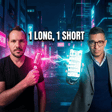

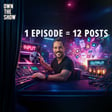
![The "Dream 100" Execution Plan [Google Sheet System] image](https://media.zencastr.com/cdn-cgi/image/width=112,quality=85/image-files/630c9f06819f8b3dba5fa460/fcd89374-76a4-4e58-a2e3-2bb7ddda4364.png)
